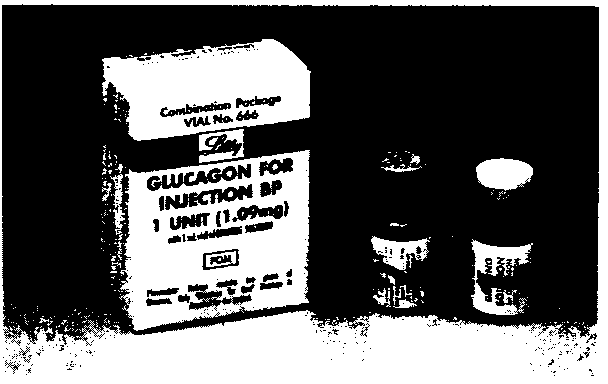
What you should know about
Glucagon for Injection BP
Glucagon is a medicine to be used in emergencies only Your doctor will tell you when it should be used Please read this leaflet carefully so that you will know how to use Glucagon in an emergency It does not contain all the information about Glucagon that you may need to know, so please ask your doctor, pharmacist or diabetes nurse specialist if you have any questions Make sure any family, friends and colleagues also understand how and when to use Glucagon This leaflet only applies to Lilly Glucagon for Injection BP
|
What is in your medicine? Your medicine is called Glucagon for Injection BP It is a white powder in a bottle The label has a green stripe and is marked number 2 Each bottle contains 1 unit of Glucagon (1.09mg) as the hydrochloride It also contains the inactive ingredient lactose There is also a bottle of diluent (liquid) to mix it with, labelled number 1 This is 1 ml of sterile water which contains glycerol and phenol |
|
|
Glucagon is a natural hormone that is made from the pancreas of cows and pigs It is the same as that made by the human pancreas
Glucagon is made by Eli Lilly and Company Indianapolis, Indiana, USA The product licence is held by Eli Lilly and Company Ltd, Dextra Court, Chapel Hill, Basingstoke, Hampshire, RG21 2SY
|
Why Glucagon? Glucagon is used to treat diabetics when they have a severe 'hypo' (hypoglycaemia) which is caused by low levels of sugar in the blood Glucagon helps you to make your own blood glucose and should be used when a diabetic suffering a 'hypo' does not get better after eating sugary food or glucose tablets Glucagon should be given to a diabetic who passes out and cannot eat or drink to raise the blood sugar |
(Smaller than original)
|
Why Glucagon - continued The early symptoms of low blood sugar can come on quickly and include: |
|
|
|
|
More severe symptoms include shallow breathing or becoming very pale or disorientated If you are not treated at once, low blood sugar can lead to blackouts, RS, coma, and even death If you are diabetic you should always have glucose tablets or sugary food, such as sweets, sugar lumps or orange juice with you Eat them as soon as you have any of the early symptoms of low blood sugar Glucagon may also be used if you have an X-ray of your stomach or intestines |
|
|
Before injecting Glucagon Make sure it is safe to use Glucagon. If you answer YES to any of the following questions, or you are not sure, ask your doctor or pharmacist if it is safe for you to use Glucagon.
Measure blood glucose after you have injected a dose of Glucagon to make sure that the injection is working If you have a severe 'hypo', act quickly Follow the instructions to inject the Glucagon and call a doctor at once If you are unconscious, someone will have to inject the Glucagon for you It is dangerous to be unconscious for a long period of time. IMPORTANT: Diabetic patients may be unconscious because they have too much sugar in the blood (hyperglycaemia) as well as from a 'hypo' In this case Glucagon will not work Get medical help at once |
|
Please read the back of this leaflet |
|
continued
What you should know about Glucagon for Injection BP - continued
|
Using Glucagon Do not make up your Glucagon Injection until you are going to use it. |
|
Do not inject Glucagon unless the solution is clear and looks like water. |
|
.
|
|
Measure the blood glucose after you have injected a dose of Glucagon. Give the patient something sugary to eat or drink as soon as he or she wakes up and can swallow. Call a doctor. If the patient does not wake up within about 15 minutes, inject another dose of Glucagon and call an ambulance at once. |
|
|
While using Glucagon Glucagon does not usually cause side-effects except for occasional nausea or vomiting. (The 'hypo' can also cause nausea or vomiting.) So that the patient does not choke on the vomit, make sure that they are Iying on their side before and when they wake up. A few patients have reported an allergic reaction to Glucagon, including skin rash, breathlessness and dizziness. You may also have diarrhoea or low levels of potassium in your blood. Tell your doctor if you have any problems when you use Glucagon. He or she has more information about Glucagon and can tell you what to do. |
|
How to store Glucagon for Injection BP Do not inject the Glucagon after the 'Use Before' date. Keep your medicine in a safe place where children cannot see or reach it. Do not let it get hot (over 25°C). Throw away any solution you do not use once the bottles have been mixed. |
REMEMBER: This medicine is for you. Never give it to others. It may harm them, even if their symptoms are the same as yours.
Date of leaflet preparation: May 1994
© Eli Lilly and Company Ltd., 1994.